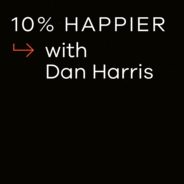In this special episode we're going to do some mindful eavesdropping. You're going to get a chance to listen in on a process that rarely, if ever, gets aired publicly. You're going to hear real students talking to a real meditation teacher about real life issues -- issues in their meditation practice, and issues related to applying meditation to your everyday life. The meditation teacher for this episode is Matthew Hepburn. Matthew has spent the last decade teaching meditation in schools, prisons, and meditation centers around the country. He's an incredibly skilled, wise, and funny teacher. He's also worked for many years at Ten Percent Happier, where Matthew is a stalwart on the content team. We cover some fascinating issues, including: how meditation can make you braver at work; undercover practices you can do with your spouse or partner; how to find meaning in everyday annoyances; how to handle fear; and the one thing that will break any meditation practice. You can listen to 20% Happier exclusively on the Ten Percent Happier app and download today: https://10percenthappier.app.link/install Full Shownotes: https://www.tenpercent.com/podcast-episode/matthew-hepburn-387

Gesundheit, Wellness & BeautyLeben & Liebe
10% Happier with Dan Harris Folgen
Self-help for smart people. World-class insights and practices from experts in modern science and ancient wisdom. Hosted by veteran journalist and best-selling author, Dan Harris.
Folgen von 10% Happier with Dan Harris
947 Folgen
-
Folge vom 13.10.2021Twenty Percent Happier | Matthew Hepburn
-
Folge vom 11.10.2021Sitting with Chaos | Zenju Earthlyn ManuelVery few of us relish chaos and disruption, but they are facts of life, given the nonnegotiable nature of change. In this episode with Zenju Earthlyn Manuel, we're going to talk about how to tune into the value of disruption, and learn how to sit with the chaos. Zenju Earthlyn Manuel is an ordained Zen priest, holds a Ph.D., and worked for decades as a social science researcher and development director for non-profit organizations. She is also a prolific author. In this conversation we'll explore: what to do with the unknown and not having any answers; the power of a "sip of silence" (her term); what she means by the phrase "death as a doorway to tenderness;" how she defines tenderness - a word that can easily get bogged down in sloppy sentimentality; and what she meant when she wrote "I'm not advocating love as an answer to all of the ills of the world. Then again, it is just that simple to be love." Content Warning: There are brief mentions of assault; spiritual, sexual, and substance abuse; and racism, including a recent incident Zenju experienced herself.
-
Folge vom 06.10.2021The Awesome Power of "Touchy-Feely" | Carole Robin and David BradfordWe talk a lot on this show about social connection, but in this episode we're going to get super granular on how to actually do relationships better. Carole Robin and David Bradford taught the most popular elective course at the Stanford Graduate School of Business for a combined total of 75 years. Officially, the name of the course is Interpersonal Dynamics, but everybody calls it "Touchy-Feely." Together they have written the new book, Connect: Building Exceptional Relationships with Family, Friends, and Colleagues. We dive into the six hallmarks of what they call "exceptional relationships," how to be honest and vulnerable without overdoing it, why the questions "how am I feeling?" and "how are you feeling?" are central to improving our communication, the inevitability of risk when you set out to deepen a relationship, and why meditation is helpful in all of this. Download the Ten Percent Happier app today: https://10percenthappier.app.link/install Full Shownotes: https://www.tenpercent.com/podcast-episode/carole-robin-david-bradford-385
-
Folge vom 04.10.2021What to do About Eco-Anxiety | Jay MichaelsonIn the mental health community, there's a new term: "Eco-Anxiety." Our guest in this episode, Jay Michaelson, has been thinking hard about climate change for many, many years. Michaelson is a meditation teacher, rabbi, lawyer, activist, and journalist. And he is also a core teacher in the Ten Percent Happier app. He's covered climate change extensively, and has taught environmental ethics at Boston University Law School and Chicago Theological Seminary. He has also been a leading environmental activist in religious communities. In this conversation, we talk about what Jay thinks some meditation teachers get wrong about climate change, what he calls the "delusion" that individual habit change can make an impact, how we can use meditation to engage more effectively in the kind of politics he says we need to move the needle on a systemic level, and how to use meditation and deep breathing to handle eco-anxiety.
